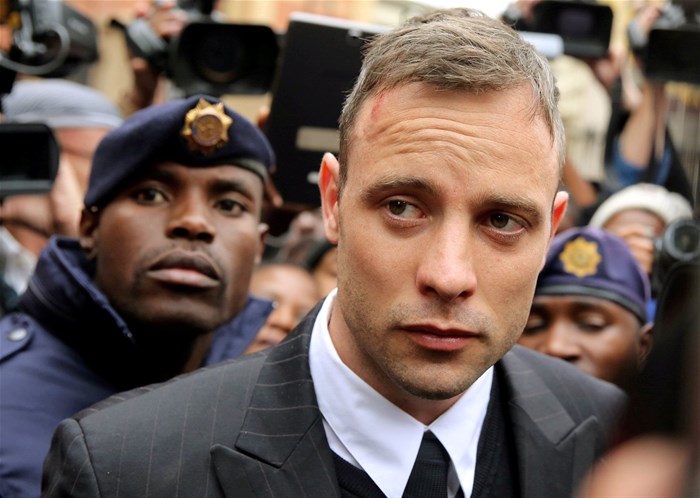Oscar Pistorius, the former Paralympic champion jailed in 2016 for murdering his girlfriend Reeva Steenkamp, will ask a parole board on Friday to release him early from prison, lawyers and prison officials said.

FILE PHOTO: Olympic and Paralympic track star Oscar Pistorius leaves court after appearing for the 2013 killing of his girlfriend Reeva Steenkamp in the North Gauteng High Court in Pretoria, South Africa, 14 June 2016. Reuters/Siphiwe Sibeko/Files
Once the darling of the Paralympic movement for pushing for greater recognition and acceptance of disabled athletes, South African Pistorius shot dead Steenkamp, a model and law student, in his bathroom on Valentine's Day in 2013.
The athlete, known as "Blade Runner" for his carbon-fibre prosthetic legs, went from public hero to convicted murderer in a trial that drew worldwide interest.
Pistorius has become eligible for parole after serving half of his sentence. Steenkamp's family oppose his bid and will give verbal and written statements at the hearing on the impact the murder had on them, their lawyer Tania Koen told Reuters.
Arriving at Atteridgeville prison near the capital Pretoria on Friday morning, Reeva's mother June Steenkamp said she was feeling nervous.
"It's going to be very hard to be in the same room as him," she told reporters from her car. "I don't believe his story."
A prison spokesperson confirmed the closed-door parole board meeting was under way.
Gun enthusiast Pistorius told his trial he had believed Steenkamp was an intruder when he shot her several times through the bathroom door with ammunition designed to inflict maximum damage to the human body.
He was jailed in 2016, initially for a six-year term, but had that sentence increased to 13 years after an appeal by prosecutors who argued the initial sentence was too lenient.
Pistorius, who had both legs amputated as a baby, reached the peak of his fame in 2012 when he became the first double amputee to compete against able-bodied athletes at the Olympics, reaching the 400m semi-finals in London.
At a trial that captured worldwide attention nine years ago, the athlete shuffled through the court without his prosthetics to show how vulnerable he was faced with the threat of an intruder.
He broke down crying as he told the court that he had been trying to protect Steenkamp when he fired the shots. The prosecutor at the time accused him of using emotional breakdowns to avoid questioning.
He met Steenkamp's father Barry last year when participating in a process known as victim-offender dialogue - part of South Africa's restorative justice programme that brings parties affected by a crime together in a bid to achieve closure.
The independent parole board must determine, among other issues, whether Pistorius is at risk of committing similar crimes in the future, prison spokesperson Singabakho Nxumalo said.
It will also consider his disciplinary record, training programmes in prison and his physical and mental state, prison officials said.
Pistorius' lawyer, Julian Knight, told Reuters he was not in a "position to comment until such time as the Parole Board has made a decision".





































